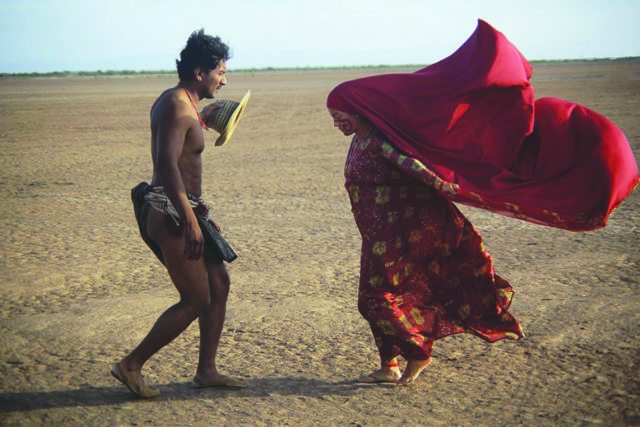
Birds of Passage (Pájaros de verano) — from Colombian directors Cristina Gallego and Ciro Guerra — is a masterpiece. Go see it.
Need more? Very well, here’s the story: Set in Colombia and spanning the years 1969 to 1980, Birds is divided into five sections, songs really, that recount the tale of ancient rituals, tight-knit tribes and the sudden and violent encroachment of capitalism thanks to the profitability of the drug trade.
Like most stories depicting the rise and fall of an empire, Birds begins with an attraction. Specifically between the young Zaida (Natalia Reyes) and the bachelor Rapayet (José Acosta) at Zaida’s coming out ceremony. With a flurry of images that both disorient and enchant, Gallego and Guerra invoke Dante’s first encounter with Beatrice in Vita Nuova: “Here is a God stronger than I who come to rule over me.”
Zaida and Rapayet are Wayuus — the indigenous tribe of northern Colombia — and Rapayet lacks the dowry necessary to wed. He teams with close friend Moises (Jhon Narváez) to hustle booze, then coffee and, finally, marijuana to visiting Americans so he can purchase the goats, cattle and necklaces required for Zaida’s hand.
Once turned on, Rapayet and Moises find that the marijuana trade is like a fire hose out of control. Suddenly the hills and deserts of Colombia are flooded with money not easily turned off or controlled. Riches may accumulate fast, but violence is always faster, and an empire built upon sand threatens to destroy millenniums worth of ritual and culture.
The past always stands to be lost in the face of progress, and the surrounding Wayuu tribes are not going to stand idly by. Historically speaking, the Wayuus held off Spanish conquistadors in the 18th century, and a couple of machine gun maniacs aren’t going to scare them off now.
At the center of this storm: Rapayet, a kingpin who is no Michael Corleone. Haunted by past actions, dreams and an ever-present specter of death that takes the form of a bird, Rapayet is a man in over his head. As the action unfolds, Rapayet has a shot-through look as if he wandered off the pages of a Gabriel García Márquez novel and found himself on the set of The Godfather as directed by Luis Buñuel.
To reiterate, Birds of Passage is a masterpiece. Coming off 2015’s equally dreamy Embrace of the Serpent, directors Gallego and Guerra worked closely with Wayuu advisors to faithfully capture the details of the culture. They took those details, decorated them with surrealistic imagery and infused them with flavors so familiar no audience should feel estranged.
Sure, you’ve seen a hundred movies about crime families; you’ve probably even seen hundreds more about the perils of drug trafficking. But not like this. It’s like a song so familiar you swear you’ve heard it before. But you haven’t, and now you can’t forget it.
ON THE BILL: Birds of Passage. April 24–27, Dairy Arts Center, The Boedecker Theater, 2590 Walnut St., Boulder, 303-440-7825, thedairy.org














